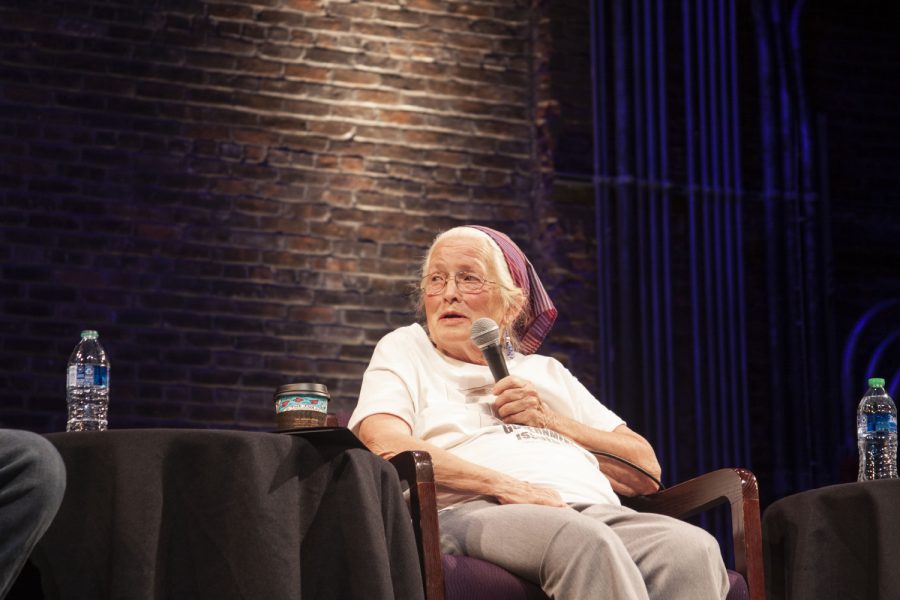Englert hosts film screening and discussion with Freedom Rider, civil rights activist Joan Trumpauer Mulholland
Joan Trumpuaer Mulholland and her son, film director Loki Mulholland, came to Iowa City to commemorate the 60th anniversary of the Freedom Rides, the bus trips through the American South to protest the segregation of public transportation.
Joan Mulholland looks to the side as she speaks during a film and discussion on the Freedom Riders at The Englert Theatre on Sept. 22 2021.
September 22, 2021
Freedom Rider and civil rights activist Joan Trumpauer Mulholland and her son, film director Loki Mulholland, came to Iowa City to visit the Englert on Wednesday night to share Loki’s film about his mother’s story, titled, An Ordinary Hero: The True Story of Joan Trumpauer Mulholland, as well as have a conversation about racial injustice and activism with those in attendance.
The event was held in commemoration of the 60th anniversary of the Freedom Rides of 1961, a series of protests including bus rides, sit-ins and bathroom breaks in “whites only” areas of buses and bus stations throughout the South to protest the segregation of facilities. It was also a movement to test a then-recent Supreme Court decision that the segregation of public transportation was unconstitutional.
The screening was followed by a discussion between Joan and Loki, moderated by writer and speaker Abena Imhotep Sankofa.
Joan has been an activist throughout her life. Not only was she a Freedom Rider, she also attended numerous other famous marches and protests, like the March on Washington and the Selma to Montgomery March. She continues to be an advocate for positive change with her foundation, the Joan Trumpauer Mulholland Foundation, which aims to “end racism through education,” she said.
RELATED: Director And Producer of ‘Hunger Ward’ Use Art For Justice
Loki also works as an activist through film. He has directed other films about race and racial injustice, including Black, White & Us and After Selma. Loki said he feels as though film is his way of expanding the conversation about race.
“I was asked once, ‘Would you have sat at the lunch counters?’ I don’t have to, because my mother did,” Loki said. “I use art and film to do what I can do to further the cause. I use film as a means of telling a single story from different perspectives.”
Loki said he feels a call to action when it comes to advocacy. He spoke often about the people whose stories he’d learned about through his work, and that he had the opportunity as a filmmaker to bring them to light.
“I have the ability and the responsibility to bring forth voices that have never been heard,” he said.
Loki and Joan said they work together to further the cause of racial equality, using their privilege as white people to include a broader audience in the racial conversation. As white people, they appeal to other white people more when they speak about race, Loki said.
RELATED: Englert Theatre to host fashion exhibit
“The fact that we’re white means that we can speak to the audiences that might not otherwise listen, because of our privilege,” he said.
Loki said their privilege makes having racial inequity conversations in schools easier, as well.
“My mom is a Trojan horse. She looks like a lot of teachers, who are also mostly white women. Because she looks like them, that makes the conversation about racial injustice easier to have in an educational space,” Loki said. “Her story helps educators expand the stories being told in schools about race, and helps to rewrite history.”
Joan and Loki’s ultimate goal is to end racism through tough conversations, artistic expression, and giving a voice to the voiceless. They said they came to Iowa City to remind the public not only how far the U.S. has come as a society against racism, but also how far the country still has left to go.
“Every voice matters,” Joan said.



